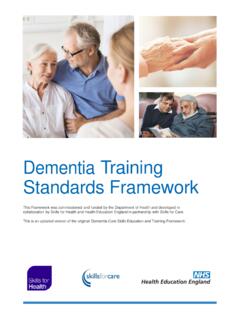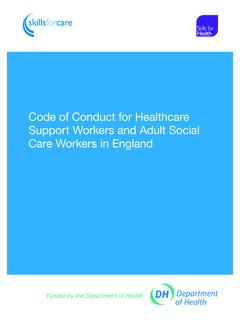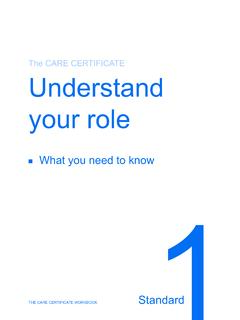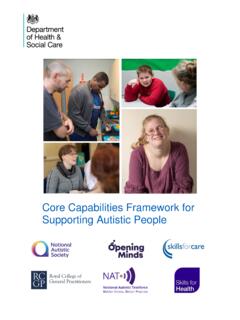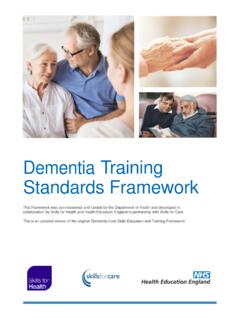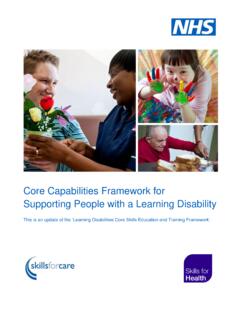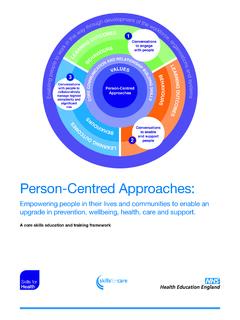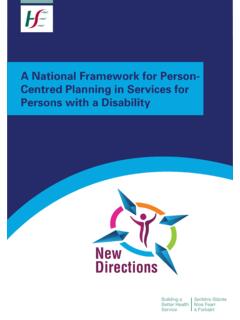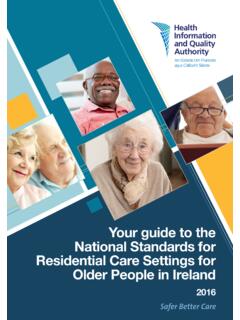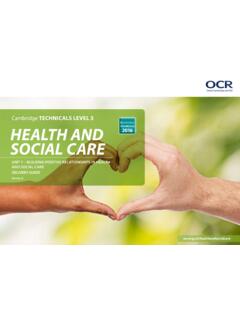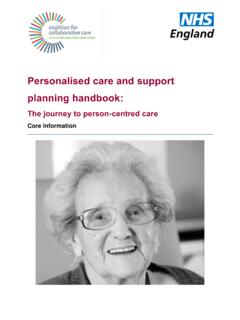Transcription of A core skills education and training framework
1 Lopment of ug h deve the hro wo ayt rkf or s w MES ce i TCO 1 , th OU. Conversations NG. or NI. in to engage RS. ga rk IOU. with people AR. wo nis AV. LE. EH. atio ND RELATIO. to NA NS. HI. ple IO. B. P. ns a T. VALUES. LE. A. Enabling peo BU. C. ARN. NI. nd systems 3. ILD. core COMMU. BEH. ING S LLS. ING OUTCOM. Conversations AVIOURS. with people to Person- centred collaboratively KI. Approaches manage highest complexity and significant risk ES. S. UR. ES. IO. AV Conversations M. BEH to enable CO. T and support G OU 2 people IN. LEARN. Person- centred Approaches: Empowering people in their lives and communities to enable an upgrade in prevention, wellbeing, health, care and support.
2 a core skills education and training framework 1. Acknowledgements This framework was commissioned by Health education England (HEE). Its development was led by Beverley Harden (HEE), with project management provided by Colin Wright ( skills for Health) and initial scoping research by Paula Knight ( skills for care ). The framework was written and compiled by Petrea Fagan, Anya de Iongh, Beverley Harden and Colin Wright. The thinking for this work began with many valued conversations involving Em Rahman and colleagues within Health education Wessex, alongside local people, Public Health, social care , housing, voluntary sector, academic and health colleagues.
3 Based on the principles of co-production, development of the framework involved the participation of a wide range of stakeholder organisations and representatives of people using health and care services. The stakeholder list compiled during development of the framework comprised approximately 300. individuals. We are particularly grateful to the members of the project steering group for providing their guidance, expertise and support during the development process and to Suzanne Wood (Improvement Fellow, The Health Foundation) for her guidance during the project. The steering group included representatives of the following organisations: Academic Health Science Network NICE.
4 Carers Trust NHS England Coalition for Collaborative care Public Health England Health education England Race Equality Foundation Leadership Academy Royal College of General Practitioners Local Government Association skills for care London Borough of Barnet skills for Health National Voices The Health Foundation New NHS Alliance TLAP (Think Local Act Personal Partnership). In addition, we would like to thank the many other people who provided comments and feedback on drafts of the framework during the project and particularly the 144 respondents to the online consultation survey. Health education England, skills for Health, and Skill for care 2017.
5 Copies of this framework may be made for non-commercial purposes to aid workforce development. Any other copying requires the permission of the publishers. Addendum in 2020. The NHS Long Term Plan sets out the strategic national plan for the NHS over the next ten years. The Long Term Plan describes five major, practical changes to the NHS service model, one of which is: People will get more control over their own health, and more personalised care when they need it . Personalised care will benefit up to million people by 2024, giving them the same choice and control over their mental and physical health that they have come to expect in every other aspect of their life.
6 A one-size-fits-all health and care system simply cannot meet the increasing complexity of people's needs and expectations. Personalised care is based on what matters' to people and their individual strengths and needs. The approaches that have been brought together to form the new personalised care strategy have previously been referred to as Person- centred care . These approaches encompass a highly relevant range of activities and knowledge. The skills and competencies needed by the workforce to provide person- centred care are just as relevant and applicable to personalised care and shouldn't be viewed separately.
7 These are applied and integrated into the roles of people working across services and sectors such as health, social care , local authorities and housing, and across different types of organisations ( public, not for profit and private). As described in the introduction of this framework , much of this approach builds on previous ground breaking work in mental health and social care over many years, which mirrors the same fundamental values and skills that underpin person- centred approaches. The phrases are used interchangeably within the system, since they share the same core principles and evidence base. The detail of the current policy for personalised care is contained within the Universal Personalised care : Implementing the Comprehensive Model.
8 The Comprehensive Model for Personalised care is an all age, whole population approach, with different components that can support people relevant to their health and wellbeing. Acknowledging that people's health and wellbeing change over time, it is the universal and comprehensive provision of the components that builds cumulative benefits for people, their family and carers and communities. The operating model to deliver personalised care defines six core activities that happen across health and social care services: shared-decision making personalised care & support planning self-management support social prescribing and community-based approaches personalised health budgets enabling choice.
9 These six core activities are facilitated by a number of enablers, including the workforce, which is directly supported by this framework and the associated suite of resources. The ambition in the Long Term Plan is for personalised care at scale, so as many people as possible can benefit throughout their lives. This requires a step-change in workforce development around the outcomes described within this framework . The terms personalised care and person- centred approaches are used interchangeably throughout these resources. As the quote from Maya Angelou says people will forget what you said, people will forget what you did, but people will never forget how you made them feel.
10 The social movement of person- centred approaches and personalised care will continue to evolve in the future, with its language naturally developing. The core skills that help people feel connected, engaged, enabled and supported remain consistent, whatever we may call them, and make this framework highly relevant in today's world of Personalised care . The knowledge and activities of person- centred approaches that are enabled through this framework include: The core of Knowledge person- centred Activities approaches The core of person- centred approaches Values Conversations to enable and Enabling people to work in this core communication and support people way through: relationship building skills Conversation with people to Development of the workforce Conversations to engage manage the highest complexity Development of organizations with people and significant risk and systems Supporting behaviour change Knowledge which may include the following.
